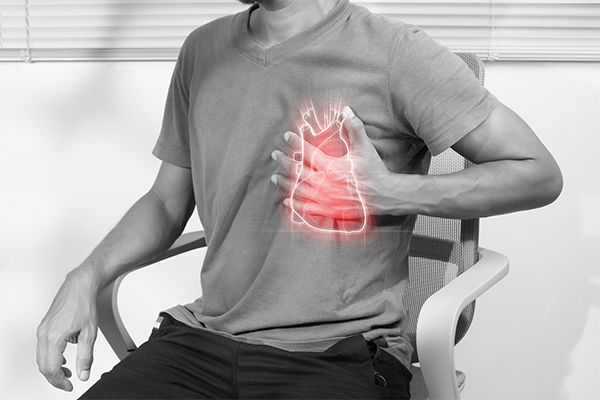
Chest pain during breathing can be alarming and may indicate various underlying health conditions. While some causes are benign, others require immediate medical attention. It's crucial to recognise these potential causes to seek timely and appropriate care. In this blog, we have discussed various possible medical conditions that chest pain indicates. It is important to report chest pain to an experienced cardiologist to rule out cardiovascular causes at the outset and thereafter determine the root cause of it and get timely treatment.
10 Causes of Chest Pain While Breathing
1. Pleurisy
-
Inflammation of the pleura, the membranes surrounding the lungs.
-
Symptoms: Sharp, stabbing chest pain that worsens with deep breaths, coughing, or sneezing.
-
Causes: Viral infections, pneumonia, and autoimmune diseases.
-
Treatment: Addressing the underlying cause, pain management, and sometimes procedures to remove excess fluid.
2. Pulmonary Embolism
-
A blood clot is blocking an artery in the lungs.
-
Symptoms: Sudden chest pain, shortness of breath, rapid heartbeat.
-
Risk Factors: Prolonged immobility, certain medical conditions, and surgery.
-
Urgency: Medical emergency requiring immediate attention.
3. Pneumothorax (Collapsed Lung)
-
Air leaks into the space between the lung and chest wall, causing lung collapse.
-
Symptoms: Sudden sharp chest pain, difficulty breathing.
-
Causes: Chest injury or lung disease.
-
Treatment: May require observation, oxygen therapy, or chest tube insertion.

4. Costochondritis
-
Inflammation of the cartilage connecting the ribs to the breastbone.
-
Symptoms: Localised chest pain that worsens with movement or deep breathing.
-
Causes: Physical strain, injury, or unknown.
-
Treatment: Pain relievers, rest, and avoiding activities that worsen pain.
More Reads: 5 Common Causes of Spinal Cord Pain
5. Pericarditis
-
Inflammation of the pericardium, the sac surrounding the heart.
-
Symptoms: Sharp chest pain that may improve when sitting up and leaning forward.
-
Causes: Infections, autoimmune conditions, and heart attack.
-
Treatment: Medications to reduce inflammation and treat underlying causes.
6. Pneumonia
-
Infection causes inflammation in the air sacs of the lungs.
-
Symptoms: Chest pain that worsens with breathing or coughing, fever, and cough with phlegm.
-
Causes: Bacterial, viral, or fungal infections.
-
Treatment: Antibiotics, antivirals, rest, and fluids.
7. Gastroesophageal Reflux Disease (GERD)
-
Stomach acid flows back into the oesophagus, irritating its lining.
-
Symptoms: Burning chest pain (heartburn), especially after eating or lying down.
-
Treatment: Lifestyle changes, antacids, or other medications.
More Reads: What Happens When You Have A Complete Heart Block?
8. Anxiety and Panic Attacks
-
Intense episodes of fear or discomfort.
-
Symptoms: Chest pain, rapid heartbeat, shortness of breath, and dizziness.
-
Note: While not life-threatening, symptoms can mimic serious conditions; medical evaluation is important.
9. Muscle Strain
-
Overuse or injury to chest muscles.
-
Symptoms: Localised chest pain that worsens with movement or deep breathing.
-
Causes: Heavy lifting, intense exercise, or sudden movements.
-
Treatment: Rest, ice, pain relievers.
10. Precordial Catch Syndrome
-
A benign condition causing sudden, sharp chest pain.
-
Symptoms: Brief, localised pain that worsens with deep breathing.
-
Common in: Children and adolescents.
-
Treatment: Typically resolves on its own; reassurance is key.
More Reads: These 6 Things Will Hurt Your Heart
Conclusion
When to Seek Medical Attention
If you experience chest pain while breathing deeply, chest pain on the right side of the chest when breathing or left chest pain while breathing, especially if it's sudden, severe, or accompanied by symptoms like shortness of breath, dizziness, or sweating, seek immediate medical care. Early evaluation can be life-saving.
FAQ's
Chest pain can result from various conditions, including:
-
Heart-related issues: Such as angina or heart attacks.
-
Lung conditions: Like pneumonia or pulmonary embolism.
-
Gastrointestinal problems: Including acid reflux or gallstones.
-
Musculoskeletal issues: Such as costochondritis or muscle strain.
-
Psychological factors: Like anxiety or panic attacks.
It's essential to consult a cardiothoracic vascular expert in Gurgaon to determine the exact cause.
You should seek emergency care if you experience:
-
Sudden, severe chest pain.
-
Pain radiating to the arms, neck, jaw, or back.
-
Shortness of breath, sweating, nausea, or dizziness.
-
Pain lasting more than a few minutes or worsening over time.
Yes, stress and anxiety can lead to chest pain, often described as tightness or pressure in the chest. While this type of pain is typically not related to heart disease, it's important to rule out other causes.
Healthcare providers may use several tests, including:
-
Electrocardiogram (ECG): To assess heart rhythm.
-
Blood tests: To detect markers of heart damage.
-
Chest X-ray or CT scan: To visualise the lungs and heart.
-
Stress tests: To evaluate heart function during exercise.
-
Echocardiogram: To examine heart structures.
These tests help identify the underlying cause of chest pain.
Preferably consult a cardiologist who can evaluate your symptoms. If a cardiologist is not available in your area then go to the nearest general physician for necessary care.





















 4 Min Read
4 Min Read











.png)









